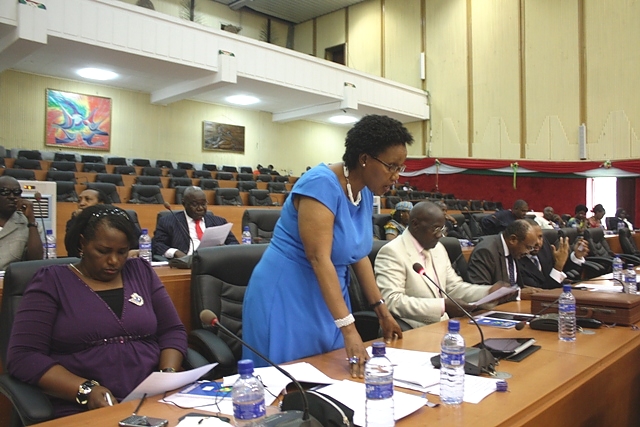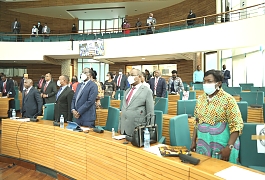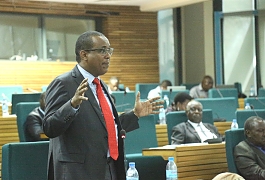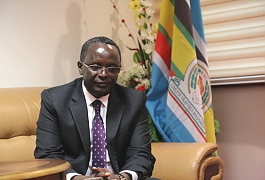EALA has maintained that the EAC-Economic Partnership Agreements (EPA) process should fully take into account the regional integration agenda and ensure the agreements realised foster economic growth and development.
In respect of the negotiations, the Assembly maintains that the negotiators should and must have policy space and the flexibility on issues of export taxes and on the Most Favoured Nations (MFN) Clause amongst others, in order to allow for value addition and enhance industrial development.
The recommendations are outlined in a report of the Committee of Communications, Trade and Investment (CTI) on the consultative workshop between EALA, Civil Society and the Private Sector on EPAs adopted by the Assembly..
The Workshop held on December 9-11th, 2012, in Nairobi, Kenya, was called to sensitise and to build the capacity of the CTI Members on various issues pertaining to EPAs. The objectives were to update and inform Members on the opportunities and challenges associated with EPAs and to come up with possible recommendations on the way forward. The report outlines the fact that various areas in the agreement have been virtually completed and such include trade in goods, fisheries, customs and trade facilitation as well as Sanitary and Phytosanitary (SPS) and Technical Barriers to Trade (TBT).
According to the report, the negotiations between EAC-EU on the EPA Rules of Origin are about 90% complete while in agriculture, the outstanding work relates to domestic support and export subsidy. It wants a number of areas under the Rules of Origin, institutional agreements, dispute settlements and final provisions and market access issues critically looked into.
The concerns raised in the negotiations include revenue loss to governments although there is still a window of potential for the EAC to offset revenue loss, especially if the bloc exploits new market opportunities that have been realized under the EPAs.EAC’s concern with export related taxes is based on the apprehension that restrictions on policy space shall impact on the export taxes as a trade policy instrument.
The report thus recommends that trade policy and negotiations have to be aligned with the industrial policy requirements and policy trade-offs and that the issues be made more explicit. On the supply side, the report implores the EU to support the region to develop infrastructure such as energy, roads and railways so as to address supply constraints. The report alludes that the issue shall address the region’s supply side constraints and trade predictability.
In finality, the Report notes that the EAC and EU commitment to EPAs is made in good faith and on the premise that once finalized, the agreements are critical tools for economic development. It thus reiterates that only political will between the concerned parties and mutually acceptable approaches to address legitimate concerns are fundamental.
Contributing to the debate, Hon Dan Kidega lauded the negotiators for taking a firm stance during the talks imploring for political support. “We must ensure resources are found to support our experts in the negotiations. We should not allow other Partners in the dispensation to provide the resources”, Hon Kidega said. Hon Frederic Ngenzebuhoro maintained that the EAC must continue negotiating as a bloc while Hon Christophe Bazivamo reiterated that it was important for the House to recommend that should trade disputes they be arbitrated in the region.
On his part, Hon Abubakar Zein Abubakar said it was vital for stakeholders such as the Private Sector and Civil Society to be involved in the process. The legislator invited the EAC to make use of the political arena noting that EALA was capable of lobbying with Parliamentarians at the EU. Hon Dr James Ndahiro challenged the Council of Ministers to share with the Assembly on the progress realised with regards to some of the findings that were previously raised by the Assembly. Other contributors in the motion were Hon Sarah Bonaya, Hon Dr. Odette Nyiramillimo and Hon Mukasa Mbidde and Hon Sarah Nakawukki.
The EAC Secretary General, Amb Dr. Richard Sezibera lauded the report saying it had fully addressed the work of the negotiators saying their task was arduous but one they had continued to handle with exemplary performance. He noted it was necessary to avoid unilateral offers but rather to negotiate terms of trade collectively. He noted that the sensitive list accepted by the EU includes almost all food and agricultural produce and remarked that EPA is not expected to destabilize the sector. The Secretary General remarked that senior officials were expected to commence on their bit of the negotiations in February 2013.
Concluding on the debate, the Chair of the EAC Council of Ministers, Hon Shem Bageine remarked that while the region was looking for a market for its raw materials, imports coming in from Europe were largely finished products rendering the EAC net importers. “ We must be very cautious and focused. We should be looking at areas where we have comparative advantage so that we compete favourably on the world market – calling for investments in natural resources”, the Minister remarked.
Meanwhile, EALA has passed a Resolution congratulating President Barrack Obama upon his recent election as the 44th President of the United States of America. The Resolution moved by Hon Hafsa Mossi and seconded by Hon Adam Kimbisa, calls upon the EAC to seize the opportunity to renew its collaboration with the United States in upholding the values of democracy and to seek development activities.
Hon Mossi noted that H.E. Obama’s vision was ambitious and that he had remained an inspiration to many Africans especially those from the EAC. Hon Mossi lauded the American President for what she instituting a visionary and progressive health policy.
During debate Hon Kimbisa noted that the EAC region was proud of President Obama terming him a renowned son of the region. Hon Leonce Ndarubagiye tabled statistics showing Hon Obama had wide support.
Other contributors were Hon Pierre Celestin Rwigema, Hon AbuBakr Ogle, Hon Dr James Ndahiro, Hon Dr. Odette Nyiramilimo, Hon Taslima Twaha, Hon Chris Opoka-Okumu, Hon Patricia Hajabakiga, Hon Abubakar Zein Abubakar, Hon Dan Kidega and Hon Yves Nsabimana.
The Resolution notes that collaboration between the USA and EAC is cordial. In that regard, it outlines the special message by the President Barrack Obama delivered to the EAC by Her Excellency Rebecca Blank, the United States Assistant Secretary of Commerce during the Summit of the EAC Heads of State held in Nairobi on 30th November, 2012.
-end-
For more information, contact
Bobi Odiko, Senior Public Relations Officer
East African Legislative Assembly,
Tel: +255-27-2508240,
Cell: +255-787-870945, +254-733-718036
Email: BOdiko@eachq.org,
Web: https://www.eala.org




